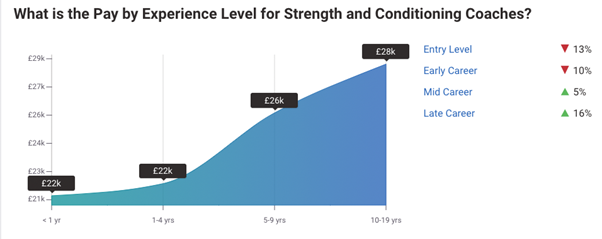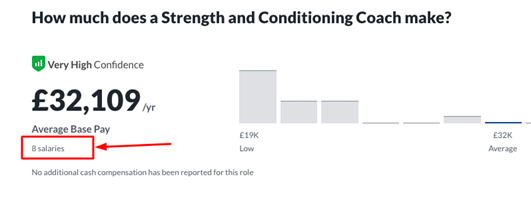
What is the salary of a Strength and Conditioning Coach? Plus 10 Popular jobs
If you are looking to learn more about the Strength & Conditioning career prospects, salaries and job roles, you are in the right place.

If you are looking to learn more about the Strength & Conditioning career prospects, salaries and job roles, you are in the right place.
Strength and Conditioning can provide a satisfying career path and if you are thinking about it, we recommend you start checking salaries and potential earnings. Luckily for you, we have done the hard part and here we provide you with comprehensive research.
First of all, let’s see what the average salaries in the UK are.
Here is what we have found. All salaries come from Payscale and Glassdoor.
On average, a Strength and Conditioning Coach in the UK earns £24,634 according to Payscale, and £32,109 according to Glassdoor.

The problem with these salaries is that they are taken from surveys made on Payscale, Indeed, and Glassdoor. These results are heavily impacted by the number of people participating in the survey, which means they must be taken with a pinch of salt.
Glassdoor, for example, revealed that only 8 people participated in the salary survey to determine the £32,109 average salary.

Therefore, we haven’t stopped our research on this data, and we have collected more insights on what the salaries look like in real life.
An entry Level S&C Coach with less than 1 year of experience, qualified with a Level 3 Course, can expect to earn an average total compensation (including tips and overtime pay) of £21,500.
This salary is normally structured this way:
This salary includes various benefits such as a pension. Also, some employers can offer more perks such as private healthcare and medical insurance.
Starting your career as an employee brings more security, a fixed salary and you can build your client base and your portfolio. For this reason, Strength and Conditioning Coaches working as employees start at a lower salary.
However, this is a great option to start your career as you can build up experience and work your way up to become a Personal Trainer or become a freelancer and start your own business.
If you are a Strength and Conditioning Coach with 4 to 7 years of experience after completing your qualifications, you can expect to earn between £25,000 and £34,000 in a full-time, employed job role.
The salary includes bonuses and overtime on top of the basic pay.
If you have more than 7 years of experience, you can expect to earn much more than a junior of course, simply because you can provide confidential advice and a long list of case studies, experiences, and employee references.
The salary on this band is between £36,000 and £60,000 per year, including overtime and bonus.
Let’s see which factors can influence salaries.
You have probably noticed this huge disparity in average salaries and it’s normally due to several factors, such as location, athletes’ levels, and company dimension and typology.
It’s more expensive to live in London where salaries for all jobs are higher than the national average. In Hull, for example, where the cost of living is lower, also salaries are lower and PayScale reports an average of £20,347 per year.
However, it’s important to remember that also expenses are higher in London, so we recommend considering the trade-off and your return on investment when choosing your work location.
If you want to seek an S&C position with a prominent sports franchise, such as Arsenal Football Club, for example, you need to know that these are well-known sports teams and global brands.
The remuneration of a Strength and Conditioning Coach is usually greater at these sorts of facilities since they want the best of the best to work with their teams. The typical compensation for a first-team Strength and Conditioning Coach at one of these sorts of organisations is roughly £40,000 to £50,000 per year.
The remuneration for a Strength and Conditioning Coach was on average £10,000 per year less when looking at semi-professional teams and clubs with lower status for the same sort of function.
There are S&C positions for mostly all athlete levels and ages. As a Strength and Conditioning Coach, your pay will usually be equal to your degree of effort. This means that your compensation will be higher if you work with the first team squad rather than the younger set-up.
If you want to become a freelancer, the main benefit is that you can charge your own hourly fee and be your own boss. Here are some considerations for going down this route.
First of all, you must be self-employed, charge £50 per hour, and work 35 hours per week to make £60,000 per year. This entails having 15 to 20 regular clients who book two sessions each week. Developing new contacts, being skilled in marketing and sales, and achieving your clients’ objectives will all aid you in achieving this compensation.
To understand your take-home income, you must also consider what is taken from these amounts. Insurance, property rental, cost of specialised courses, credentials, and income taxes may all be significant expenditures for a freelance personal trainer.
On top of the factors that we have considered above (location, type of athletes, and level of experience), for freelancers, some other factors come into play that can increase (or decrease) your hourly fee.
The most obvious one is personal branding.
If you want to charge £100 an hour or more and attract elite athletes, for example, you’ll need to position yourself as an elite-level coach.
S&C coaches working with elite athletes represent the top of their profession and the ultimate goal. To get to this level, there are a number of career steps you need to follow in terms of qualifications, experience, and skills required to reach that goal.
Having a strong foundation in strength and conditioning education and CPD, such as a Level 3 Strength and Conditioning certificate is the bare minimum. By being published in fitness-related media, you may build trust and get visibility.
Many elite S&C Coaches became proficient at using Instagram and other social media channels to generate buzz, attention online, and a large following. Here you can see a list of S&C coaches worth following. Others write books on the topic as a platform to launch their career and their personal branding.
As with any other employment, you may get strength and conditioning roles on sites like Indeed, LinkedIn, Glassdoor, and TotalJobs, but the majority of famous sports teams, associations, and institutions prefer to advertise in more particular platforms like:
There are hundreds of strengths and conditioning positions available, ranging from internships to directorships, so you can compare income ranges and prospects. Alternatively, find more detail in our top strength and conditioning jobs blog.
The Strength and conditioning industry can provide numerous different routes once qualified in Strength and Conditioning. These job opportunities vary from having a degree level qualification as well as opportunities available from private study courses such as a Level 4 Strength and Conditioning qualification. The job roles vary from working with professionals, teaching in schools or becoming specialist personal trainers.
The strength and conditioning market is ever-growing and encompasses a huge selection of training elements that give Personal Trainers and coaches specific knowledge to get the most out of their clients and athletes. Below we have researched several different strength and conditioning jobs with a brief summary of the role and salaries.
A strength and conditioning coach is responsible for establishing and maintaining a strength and conditioning program for all sports, the aim of the strength and conditioning program is to improve athletic performance, reduce injury risks and improve lifelong fitness skills. As a strength and conditioning coach, you could work amongst education providers (colleges/university teams), in gyms or health clubs in this job role.
Working as a strength and conditioning coach in these types of positions according to payscale you can earn anywhere between £18,000-£45,000 per year. Just like other industries and job roles the more experience you gain and the additional learning you take on you are likely to start earning more.
A sports performance manager will delegate and lead a team of sports science and sports medicine professionals to help assist athletes in optimizing their sports performance. To become a sports performance manager you are likely to be qualified at a degree level and have years of experience working underneath this type of job role first, this is a job you will work towards by building on your knowledge and experience to demonstrate your leadership and management skills in this industry.
Working as a sports performance manager as a higher job role according to glassdoor you can earn between £32,000 to £91,000. This salary will vary depending on the job role this position is working in, professional sports clubs and teams are likely to pay higher than this job in other fields.
Strength and conditioning is something you can qualify in on top of your Level 3 Personal Trainer course. The UKSCA Strength and conditioning course is specifically designed to allow you to work with a wide range of clients within the Strength & Conditioning sector, this can help increase your earning potential. Becoming a specialist as a personal trainer in strength and conditioning will allow you to provide additional knowledge to your client’s training, by understanding the fundamentals behind strength training and particular movements.
As a Personal Trainer qualified in Strength and Conditioning according to glassdoor you can earn anywhere between £19,000 to £41,000. As a personal trainer, your earning potential can be dependent on how many clients you have, the more clients you take on and the more sessions you run will be reflected in the salary you make.
The main job role of the athletic trainer is to ensure the health and safety of professional athletes, they work closely with Physicians to provide advice and guidance for injuries. As an athletic trainer, you will look after athletes’ health conditions, training routines, diet plans and fitness. As an athletic trainer, you are likely to have a degree in sports nutrition, anatomy or human biology.
According to glassdoor athletic trainers can earn between £23,500 up to £42,000 per year, again similar to most jobs the salary can vary depending on both location and experience.
The main role of a Physical Therapist is to plan and execute rehabilitation programmes to help aid and guide patients to improved health after experiencing injury or reduced mobility. The purpose of a physical therapist is to help clients reach their peak health again, this is often impacting athletes so it plays an important role in managing this. A Physical Therapist will be qualified at a degree level in a bachelor of science.
A Physical Therapist according to glassdoor can earn between £29,000 to £52,000 depending on both experience and location.
As an exercise physiologist, you will investigate how clients respond and adapt to muscular activity and will use both skills and knowledge to improve both performance and fitness levels. Typically in this role, you are able to provide scientific support to athletes and sports teams to help improve performance and optimize peak health. An exercise physiologist will develop and create exercise programs to help clients or patients recover from injury or disease. Exercise Physiologist according to glassdoor can earn between £22,000 up to £47,000 per year, the more experience gained in this field naturally the more you can earn.
By becoming a Strength and Conditioning trainer, you will be able to work within a larger strength and conditioning team at a professional sports club under the supervision of an Accredited S&C Coach. Once studying a Level 3 Strength and Conditioning Course, you have the opportunity to start working as a trainer, this is a great entry-level into the industry to gain experience in the field. An S&C Trainer in this position could be referred to as ‘Assistant S&C Coach’. As a strength and conditioning trainer according to glassdoor you can earn between £16,000 to £43,000 per year.
The strength and conditioning job as a Sports Coach has the responsibility to plan, organise and deliver a range of sports activities or programs. Typically as a sports coach, you will work amongst schools, colleges, or universities teaching relevant skills and techniques. You will use your strength and conditioning knowledge to provide tuition, encouragement and constructive feedback. Working as a Sports Coach you can earn between £16,000 up to £33,000 per year.
A professional Strength and Conditioning Coach works alongside athletes are large sports teams to apply professional scientific knowledge with the primary goal of improving overall performance. To work as a professional Strength and Conditioning Coach you are qualified at a higher degree level, this is due to working directly longer side professional athletes which requires more extensive training.
Many organizations begin by giving internships to people nearing completion of their Level 4 strength and conditioning certification or their last year of study. Internships allow sports teams to recruit S&C coaches for a minimum salary or, in certain cases, for nothing if the internship is a placement. The average salary is can go from £0 to £17,000 per year.